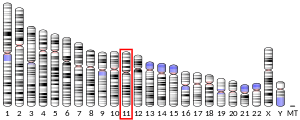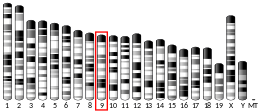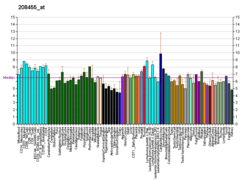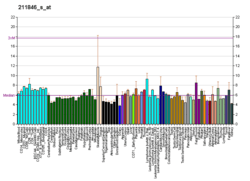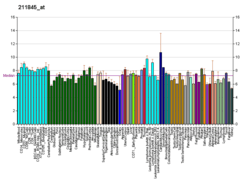Poliovirus receptor-related 1
Poliovirus receptor-related 1 (PVRL1), also known as nectin-1 and CD111 (formerly herpesvirus entry mediator C, HVEC) is a human protein of the immunoglobulin superfamily (IgSF), also considered a member of the nectins.[5] It is a membrane protein with three extracellular immunoglobulin domains, a single transmembrane helix and a cytoplasmic tail. The protein can mediate Ca2+-independent cellular adhesion further characterizing it as IgSF cell adhesion molecule (IgSF CAM).
Function
PVRL1 is an adhesion molecule found in a wide range of tissues where it localizes in various junctions such as the adherens junction of epithelial tissue or the chemical synapse of neurons. The cytoplasmic tail of PVRL1 can bind the protein afadin which is a scaffolding protein that binds actin.
In the chemical synapse PVRL1 interacts with PVRL3 (nectin-3) and both proteins can be found in neuronal tissue already in early stages of brain development as well as in aging brains. Interestingly the two proteins have been found to localize asymmetrically along the chemical synapse, with PVRL1 primarily on the axonal side and PVRL3 on the dendritic side.
The protein has been revealed as one of the key players in mediating cellular entry of the Herpes simplex virus by interacting with the viral glycoprotein D (gD).[6]
See also
References
- GRCh38: Ensembl release 89: ENSG00000110400 - Ensembl, May 2017
- GRCm38: Ensembl release 89: ENSMUSG00000032012 - Ensembl, May 2017
- "Human PubMed Reference:". National Center for Biotechnology Information, U.S. National Library of Medicine.
- "Mouse PubMed Reference:". National Center for Biotechnology Information, U.S. National Library of Medicine.
- "Entrez Gene: PVRL1 poliovirus receptor-related 1 (herpesvirus entry mediator C; nectin)".
- Cocchi F, Lopez M, Menotti L, Aoubala M, Dubreuil P, Campadelli-Fiume G (1999). "The V domain of herpesvirus Ig-like receptor (HIgR) contains a major functional region in herpes simplex virus-1 entry into cells and interacts physically with the viral glycoprotein D". Proc. Natl. Acad. Sci. U.S.A. 95 (26): 15700–5. doi:10.1073/pnas.95.26.15700. PMC 28107. PMID 9861033.
- Takahashi K, Nakanishi H, Miyahara M, Mandai K, Satoh K, Satoh A, Nishioka H, Aoki J, Nomoto A, Mizoguchi A, Takai Y (May 1999). "Nectin/PRR: An Immunoglobulin-like Cell Adhesion Molecule Recruited to Cadherin-based Adherens Junctions through Interaction with Afadin, a PDZ Domain–containing Protein". J. Cell Biol. 145 (3): 539–49. doi:10.1083/jcb.145.3.539. PMC 2185068. PMID 10225955.
Further reading
- Bustos T, Simosa V, Pinto-Cisternas J, Abramovits W, Jolay L, Rodriguez L, Fernandez L, Ramela M (1992). "Autosomal recessive ectodermal dysplasia: I. An undescribed dysplasia/malformation syndrome". Am. J. Med. Genet. 41 (4): 398–404. doi:10.1002/ajmg.1320410403. PMID 1776626.
- Lopez M, Eberlé F, Mattei MG, Gabert J, Birg F, Bardin F, Maroc C, Dubreuil P (1995). "Complementary DNA characterization and chromosomal localization of a human gene related to the poliovirus receptor-encoding gene". Gene. 155 (2): 261–5. doi:10.1016/0378-1119(94)00842-G. PMID 7721102.
- Bonaldo MF, Lennon G, Soares MB (1997). "Normalization and subtraction: two approaches to facilitate gene discovery". Genome Res. 6 (9): 791–806. doi:10.1101/gr.6.9.791. PMID 8889548.
- Geraghty RJ, Krummenacher C, Cohen GH, Eisenberg RJ, Spear PG (1998). "Entry of alphaherpesviruses mediated by poliovirus receptor-related protein 1 and poliovirus receptor". Science. 280 (5369): 1618–20. doi:10.1126/science.280.5369.1618. PMID 9616127.
- Suzuki K, Bustos T, Spritz RA (1998). "Linkage disequilibrium mapping of the gene for Margarita Island ectodermal dysplasia (ED4) to 11q23". Am. J. Hum. Genet. 63 (4): 1102–7. doi:10.1086/302072. PMC 1377504. PMID 9758630.
- Cocchi F, Menotti L, Mirandola P, Lopez M, Campadelli-Fiume G (1998). "The Ectodomain of a Novel Member of the Immunoglobulin Subfamily Related to the Poliovirus Receptor Has the Attributes of a Bona Fide Receptor for Herpes Simplex Virus Types 1 and 2 in Human Cells". J. Virol. 72 (12): 9992–10002. PMC 110516. PMID 9811737.
- Cocchi F, Lopez M, Menotti L, Aoubala M, Dubreuil P, Campadelli-Fiume G (1999). "The V domain of herpesvirus Ig-like receptor (HIgR) contains a major functional region in herpes simplex virus-1 entry into cells and interacts physically with the viral glycoprotein D". Proc. Natl. Acad. Sci. U.S.A. 95 (26): 15700–5. doi:10.1073/pnas.95.26.15700. PMC 28107. PMID 9861033.
- Takahashi K, Nakanishi H, Miyahara M, Mandai K, Satoh K, Satoh A, Nishioka H, Aoki J, Nomoto A, Mizoguchi A, Takai Y (1999). "Nectin/PRR: An Immunoglobulin-like Cell Adhesion Molecule Recruited to Cadherin-based Adherens Junctions through Interaction with Afadin, a PDZ Domain–containing Protein". J. Cell Biol. 145 (3): 539–49. doi:10.1083/jcb.145.3.539. PMC 2185068. PMID 10225955.
- Miyahara M, Nakanishi H, Takahashi K, Satoh-Horikawa K, Tachibana K, Takai Y (2000). "Interaction of nectin with afadin is necessary for its clustering at cell–cell contact sites but not for its cis dimerization or trans interaction". J. Biol. Chem. 275 (1): 613–8. doi:10.1074/jbc.275.1.613. PMID 10617658.
- Suzuki K, Hu D, Bustos T, Zlotogora J, Richieri-Costa A, Helms JA, Spritz RA (2000). "Mutations of PVRL1, encoding a cell–cell adhesion molecule/herpesvirus receptor, in cleft lip/palate-ectodermal dysplasia". Nat. Genet. 25 (4): 427–30. doi:10.1038/78119. PMID 10932188.
- Lopez M, Cocchi F, Avitabile E, Leclerc A, Adelaide J, Campadelli-Fiume G, Dubreuil P (2001). "Novel, Soluble Isoform of the Herpes Simplex Virus (HSV) Receptor Nectin1 (or PRR1-HIgR-HveC) Modulates Positively and Negatively Susceptibility to HSV Infection". J. Virol. 75 (12): 5684–91. doi:10.1128/JVI.75.12.5684-5691.2001. PMC 114282. PMID 11356977.
- Sözen MA, Suzuki K, Tolarova MM, Bustos T, Fernández Iglesias JE, Spritz RA (2001). "Mutation of PVRL1 is associated with sporadic, non-syndromic cleft lip/palate in northern Venezuela". Nat. Genet. 29 (2): 141–2. doi:10.1038/ng740. PMID 11559849.
- Struyf F, Posavad CM, Keyaerts E, Van Ranst M, Corey L, Spear PG (2002). "Search for polymorphisms in the genes for herpesvirus entry mediator, nectin-1, and nectin-2 in immune seronegative individuals". J. Infect. Dis. 185 (1): 36–44. doi:10.1086/338116. PMID 11756979.
- Fabre S, Reymond N, Cocchi F, Menotti L, Dubreuil P, Campadelli-Fiume G, Lopez M (2002). "Prominent role of the Ig-like V domain in trans-interactions of nectins. Nectin3 and nectin 4 bind to the predicted C-C'-C"-D beta-strands of the nectin1 V domain". J. Biol. Chem. 277 (30): 27006–13. doi:10.1074/jbc.M203228200. PMID 12011057.
- Yoon M, Spear PG (2002). "Disruption of Adherens Junctions Liberates Nectin-1 To Serve as Receptor for Herpes Simplex Virus and Pseudorabies Virus Entry". J. Virol. 76 (14): 7203–8. doi:10.1128/JVI.76.14.7203-7208.2002. PMC 136315. PMID 12072519.
- Struyf F, Martinez WM, Spear PG (2002). "Mutations in the N-Terminal Domains of Nectin-1 and Nectin-2 Reveal Differences in Requirements for Entry of Various Alphaherpesviruses and for Nectin-Nectin Interactions". J. Virol. 76 (24): 12940–50. doi:10.1128/JVI.76.24.12940-12950.2002. PMC 136698. PMID 12438620.
- Takekuni K, Ikeda W, Fujito T, Morimoto K, Takeuchi M, Monden M, Takai Y (2003). "Direct binding of cell polarity protein PAR-3 to cell–cell adhesion molecule nectin at neuroepithelial cells of developing mouse". J. Biol. Chem. 278 (8): 5497–500. doi:10.1074/jbc.C200707200. PMID 12515806.
- Krummenacher C, Baribaud I, Eisenberg RJ, Cohen GH (2003). "Cellular Localization of Nectin-1 and Glycoprotein D during Herpes Simplex Virus Infection". J. Virol. 77 (16): 8985–99. doi:10.1128/JVI.77.16.8985-8999.2003. PMC 167240. PMID 12885915.
- Bender FC, Whitbeck JC, Ponce de Leon M, Lou H, Eisenberg RJ, Cohen GH (2003). "Specific Association of Glycoprotein B with Lipid Rafts during Herpes Simplex Virus Entry". J. Virol. 77 (17): 9542–52. doi:10.1128/JVI.77.17.9542-9552.2003. PMC 187402. PMID 12915568.
External links
- PVRL1+protein,+human at the US National Library of Medicine Medical Subject Headings (MeSH)
This article incorporates text from the United States National Library of Medicine, which is in the public domain.
